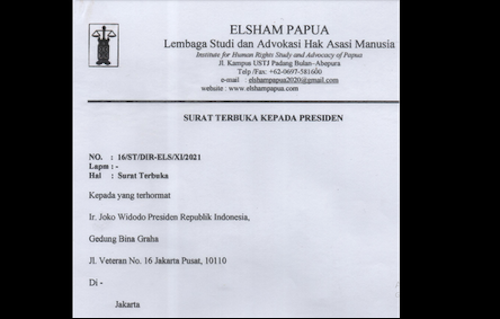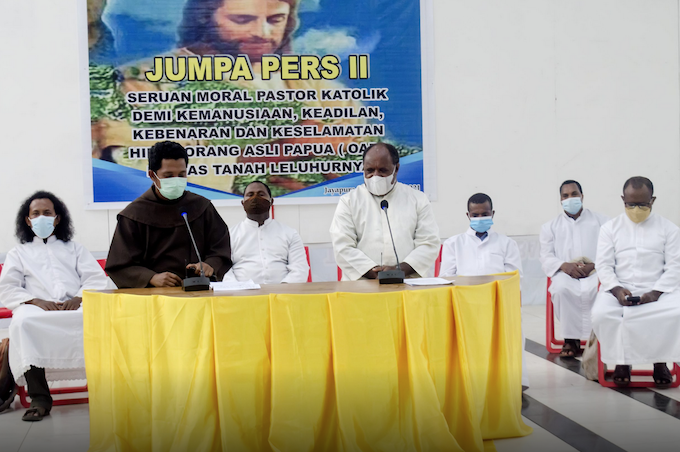By David Robie
Pressure is mounting on Indonesia to back off its brutal and unsuccessful military strategy in trying to crush West Papuan resistance to its flawed rule in “the land of Papua”.
Critics have intensified their condemnation of the intransigent “no negotiations” stance of authorities as West Papuans mark their national day today on 1 December 1961 when the banned Morning Star flag of independence was raised for the first time.
The TNI (Indonesian military), the Polri (Indonesian police) and the West Papua National Liberation Army (TPNPB) have been locked in a conflict since Jakarta ordered a crackdown in May following a declaration of resistance groups as “terrorists”.
- READ MORE: ‘We are living in a war zone’: violence flares in West Papua as villagers forced to flee
- Other West Papua reports
Many groups have raised their criticism of Jakarta’s flawed handling of its two colonised Melanesian provinces, Papua and West Papua. Recent developments include:
- The Papua Council of Churches has made a “moral call” condemning the Indonesian government for continuing to choose a “path of violence” in dealing with the armed conflict in Papua being waged by OPM rebels and other pro-independence militia groups.
- The Papua Institute for Human Rights Studies and Advocacy (ELSHAM Papua) has sent an open letter to President Joko “Jokowi” Widodo calling on him to withdraw all non-organic troops from Papua.
- Today also marks the first anniversary of the formation of the United Liberation Movement for West Papua (ULMWP) provisional government and interim president Benny Wenda has called for a day of peaceful prayer and solidarity.
- One hundred and ninety-four Catholic leaders from across Papua have called for an end to military operations, saying dialogue and reconciliation would be the best way to resolve the prolonged conflict.
- Coinciding with the COP26 climate summit in Glasgow, Scotland, earlier this month, Wenda and other Papuan leaders had launched a “Green State Vision” pledging to address the climate emergency and impact of natural resource extraction in an “independent” West Papua.
- They added that they would make “ecocide” a serious crime in the world’s third largest rainforest after the Amazon and the Congo.
‘Path of violence’
Pastor Benny Giay, a member of the Papua Council of Churches, says the Indonesian government is still choosing the path of violence in dealing with the armed conflict.
The council has come to this conclusion based on its experience of how conflicts in Papua have been handled in the past and the recent situation, involving six regencies in Papua — Intan Jaya, the Bintang Mountains, Nduga, Yahukimo, Maybrat and Puncak Papua.
“Based on past experience and the most recent facts, we concluded that the Indonesian government is still choosing the path of violence in dealing with the Papua conflict,” said Pastor Giay, according to CNN Indonesia.
Giay said that as a consequence of many years of armed conflict, at least 60,000 Papuans had fled into the forests or neighbouring regencies.
He and three other pastors view this as part of what could not be separated from the politics of “systematic racism”.
They suspect that “buzzers” — fake internet account operators — are being used by Indonesian intelligence and pro-government groups.
These buzzers, said Pastor Giay, continued to spread hoaxes and news containing anti-Papuan views based on racism against the Papuan people.
‘Prolonged suffering’
The Papua Council of Churches is calling for the United Nations Human Rights Council (Dewan HAM PBB) to visit Papua to see the humanitarian crisis directly – “the prolonged suffering of Papuans for the last 58 years.”
The council also wants the Indonesian government to put an end to its racist policies.
Pastor Giay and his fellow pastors have demanded that President Widodo be consistent about a statement he made on September 30, 2019, agreeing to dialogue with the ULMWP.
“Mediated by a third party [in a similar way] as took place between the Indonesian government and the GAM (Free Aceh Movement) on August 15, 2005,” said Pastor Giay.
Deputy Presidential Chief of Staff Jaleswari Pramodhawardani has reportedly said that the government was managing the security situation in Papua and West Papua provinces in “accordance with the law”.
This was conveyed in response to a UN report in intimidation and violence against human rights activists in Papua, says CNN Indonesia.

Open letter of protest
On November 15, ELSHAM Papua sent an open letter to President Widodo protesting about the presence of non-organic troops in Papua and West Papua provinces. It says this has resulted in the deaths of many civilian victims as well as members of the TNI, Polri and the TPNPB, according to Suara Papua.
Each time an armed conflict happened, the first casualties were mothers and children — along with the elderly — who were forced to seek shelter and were suffering, ELSHAM said.
“What is happening at the moment, once again shows that the state has been negligent in protecting its citizens,” it said.
“It should be the responsibility of the state to protect its citizens as mandated by the preamble to the 1945 Constitution — that the state is obliged to protect everyone regardless of their birthplace in Indonesia.”
The open letter asked the government to withdraw all non-organic troops from Papua, for the TNI, Polri and TPNPB troops to restrain themselves, and for both warring parties to prioritise respect for human rights.
The letter also declared that security forces should not become the “accomplices of business interests and companies” in Indonesia — and instead be the protectors of ordinary people and “good” law enforcement officials.
The open letter was supported by 24 civil society organisations which work in human rights, justice and the environment.

Catholic leaders protest
On November 11, some 194 Catholic leaders in Papua called for an end to Indonesian military operations.
Speaking on behalf of the priests, Father Alberto John Bunai said the government had been ecstatic over the success of the recent 20th National Games in Papua, but the people were “deeply saddened by the suffering of God’s communities” in Nduga, Intan Jaya, Puncak, Kiwirok and Maybrat.
“To solve the root of the problem, what is needed is dialogue and reconciliation in a dignified manner,” Father Bunai said at a “moral call” media conference in Waena, Jayapura.
It was the church’s duty to articulate the “cries of God’s communities” who had no voice, Father Bunai said.
“The government must halt the ongoing military operations which have resulted in the killing of civilians, violence and people being displaced in several parts of Papua.”
This content originally appeared on Asia Pacific Report and was authored by David Robie.
David Robie | Radio Free (2021-11-30T15:03:03+00:00) Pressure mounts on Jakarta for dialogue, not brutal ‘war on Papua’. Retrieved from https://www.radiofree.org/2021/11/30/pressure-mounts-on-jakarta-for-dialogue-not-brutal-war-on-papua/
Please log in to upload a file.
There are no updates yet.
Click the Upload button above to add an update.